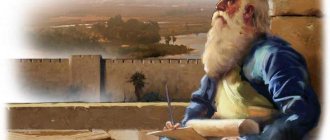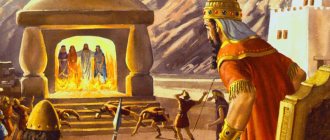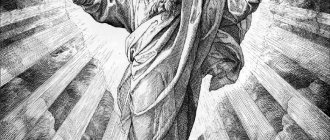The Bible is a storehouse of wisdom for an Orthodox Christian. There are books of a historical nature in it, and there are books about man’s relationship with God. But human life is not limited only to communication with higher powers!
There are many areas where a believer could benefit from advice. Fortunately, some ancient texts were written specifically for this purpose. For example, the Book of Wisdom of Jesus, son of Sirach.
Let's take a closer look at this work.
The author of the book of the wisdom of Jesus is an educated man and traveler
The Book of Sirach, as it is also called for short, is an unusual biblical text, if only because we know the name of the author. Very often, theologians only guess who created this or that manuscript. The names of the authors of the Gospels are a convention; nothing is said about them in the New Testament. Moses as the author of the Pentateuch is also a guess.
Yeshua Ben Sirach, author of the Book of Wisdom, is traditionally depicted holding a scroll
But the book of wisdom of Jesus, son of Sirach has an indication of the author. Different translations and manuscripts differ, but it is most likely that this man’s name was Yeshua Ben-Sirach, or Jesus Ben-Sirach - if remade in a modern manner. Some researchers believe that the author's full name is Yeshua ben Eleazar ben Sirach.
Who this person was is unknown. But based on the text, you can make a few educated guesses:
The author has traveled a lot. He describes the realities of different peoples and countries that he could get acquainted with if he traveled a lot. This is debatable. It cannot be ruled out that Ben Sirach simply communicated with different people or simply read enough. However, researchers see the author’s extensive life experience.
And Ben Sirach himself gives reason to consider him a traveler:
“While still a youth, before I went on a journey, I openly sought wisdom in my prayer.”
(51:18)
The author is a scientist. The very language and erudition of the author demonstrate that he is not a simple person, but a very educated one. If we turn to the text, it directly says that Ben Sirach was a teacher in the house of learning:
(51:31–32)
“Draw near to me, you unlearned, and settle in the house of learning, for you have need of it and your souls greatly thirst.”
Could this be a metaphor? Yes. But the instructive tone of the entire manuscript makes one believe in the version about the scientist. And the author himself emphasizes the importance of knowledge:
(38:24)
“Book wisdom is acquired in favorable times of leisure, and those who have little to do can acquire wisdom.”
The author of the Book of Wisdom called to the house of learning (school)
The author often risked his life. No matter what Yeshua Ben Sirach did, his life was not calm:
“I will glorify You, O Lord the King, and I will praise You, God my Savior; I glorify Your name, for You were my patron and helper and delivered my body from destruction and from the network of a slanderous tongue, from lips that weave lies; and against those who rose up against me, You were my helper and delivered me, because of the abundance of mercy and for the sake of the name
Yours, from the gnashing of teeth ready to devour me, from the hands of those who sought my soul, from the many sorrows that I had, from the fire suffocating on all sides and from the midst of the flame in which I was not burned, from the depths of the belly of hell, from the unclean tongue and false words, from slander before the king of the unrighteous tongue.
My soul was close to death, and my life was near the underworld: they surrounded me on all sides, and there was no help; I looked with my eyes for intercession from people, and there was none.”
There is reason in the text to suspect that Ben Sirach is a doctor. The beginning of Chapter 38 pays a lot of attention to this profession:
“Honor the doctor according to the need for him, for the Lord created him, and healing comes from the Most High, and he receives a gift from the king. The doctor’s knowledge will raise his head, and he will be held in high esteem among nobles.”
(38:1–3)
Given the theological focus of the text, it is fair to assume that Yeshua Ben Sirach is a priest. Such versions occur, but they have as many opponents as supporters. There are suggestions that the author was in a position of influence if he refers to himself in this passage:
“Only he who devotes his soul to meditation on the law of the Most High will seek the wisdom of all the ancients and practice prophecy: he will notice the sayings of famous men and delve into the subtle turns of parables; will explore the hidden meaning of sayings and deal with the riddles of parables.
He will serve among the nobles and appear before the ruler; will travel through the land of foreign nations, for he has experienced good and evil among people.”
(39:1–5)
It is known that the book was translated into Greek by the author’s grandson. At least he says that the writer is his grandfather. The translator gives vague indications of his time, from which two versions emerge about the century of the book’s creation:
- beginning of the 3rd century BC;
- beginning of the 2nd century BC.
The problem is that the book lacks historical references. One of them is the mention of Simon, son of Onias. But there are only two people known in history with such names.
The Book of Wisdom of Jesus, son of Sirach, is teaching without a clear structure
According to the content of the Book of Wisdom of Jesus, son of Sirach, it is instructive biblical literature. There are similar books in the Bible:
- Book of Job;
- Book of proverbs;
- Book of Ecclesiastes.
The purpose of such texts is to present the doctrine of wisdom. This is precisely the task that is performed by the main body of text - up to chapter 43.
43 chapters of the Book of Wisdom of Jesus, son of Sirach consist of instructions.
The author focuses on the issue of wisdom. What is wisdom? Where does it begin and what does it consist of? The answer is formulated already in the first chapter:
“The fear of the Lord is glory and honor and gladness and a crown of joy. The fear of the Lord will sweeten the heart and give joy and gladness and long life. He who fears the Lord will have good fortune in the end, and on the day of his death he will receive a blessing.
The fear of the Lord is a gift from the Lord and leads on the paths of love. Love for the Lord is glorious wisdom, and whoever He pleases shares it as He pleases. The beginning of wisdom is to fear God, and with the faithful it is formed together in the womb. She has established an eternal foundation for herself among people and will entrust herself to their seed.”
That is, a wise person is one who believes God and fulfills His laws. Compliance with the rules of the Almighty is one of the main tasks of a believer, according to Jesus Ben Sirach.
“All wisdom is from the Lord...” - the beginning of the first chapter of the Book of Sirach, unknown artist, 1654
But not only fulfilling the commandments, but their careful keeping is one of the duties of a righteous person. However, one cannot limit oneself to the law of God in the material world. Jesus, the son of Sirach, gives a list of instructions on a variety of issues in human life:
- relationships with friends;
- the role of evil and good in human life;
- parenting;
- sweating of elders;
- caring for the younger ones;
- tasks of people of different professions;
- happiness and wickedness;
- health and illness;
- poverty and wealth.
In one book, the author tries to have time to address each person based on his role. Here are examples of instructions:
“Do not envy the glory of a sinner, for you do not know what his end will be.”
(9:14)
“If you do good, know to whom you do it, and there will be gratitude for your good deeds.”
(12:1)
“Do not despise a person in his old age, for we too grow old. Do not rejoice in the death of a person, even if he was the most hostile to you: remember that we will all die.”
(8:7)
The Book of Wisdom of Jesus son of Sirach is a non-canonical book, not included in the Masoretic Bible, although written in Hebrew: “included in the Greek Bible, but not in the Hebrew canon.”[1] The Orthodox assessment of the canonicity of the books of Holy Scripture is based on an assessment of the importance of the content of these books. The Greek word canon itself has its etymological origin in the Hebrew kanna, which meant measuring stick.[2] Among Alexandrian and Greek scholars this word meant a pattern, a rule; among grammarians this word meant the rules for declension of grammatical forms; for critics of ancient literature - a catalog of works; New Testament writers have moral rules (Gal. 6:16; Phil. 3:16; 1 Cor. 10:13 – 16).[3] “In relation to sacred books, the name “canonical” indicates that they, as written by revelation from the Holy Spirit, contain immutable truth and therefore in their content represent unchangeable rules of faith and morals.”[4] The name of “non-canonical” books is based on the recognition of such books as not inspired by God. “Non-canonical books of the Holy Scriptures are books that, although written by pious men, are not inspired by God and therefore cannot serve in all their content as an unchangeable rule of faith and morals and are not included in the list of sacred, divinely inspired books by the definitions of the Church.”[5] Saint Philaret of Moscow in his “Long Christian Catechism”, when dividing the books of the Bible into canonical and non-canonical, justifies the separation of the latter by the absence of their Jewish original and the presence of only a Greek primary source.[6]
The Church of Christ values non-canonical books, firstly, as an inexhaustible source of wisdom. “This is natural, since the Holy Spirit, who wrote the words of eternal life through the chosen people of God in the sacred books, is always life-giving, and the word of God contained in the Bible is always vital, modern and will never cease to be effective.”[7] That is why so many Old Testament proverbs read during worship are taken from the non-canonical books of Wisdom. Secondly, the non-canonical books of Wisdom contain such moral criteria for a person’s relationship with God and neighbor that they, without exaggeration, can be placed on a par with the New Testament Gospel commandments. The recognition of the sacred dignity of this book by the Orthodox Church is evident from the fact that the passages in it that speak of the immortality of the soul and the eternal “in glory” life of the righteous are chosen and included in worship in the form of Vespers paremias on feasts in honor of the saints.[8]
The history of the text of this biblical monument is quite remarkable. Blazh. To Jerome of Stridon, the Book of Wisdom of Jesus son of Sirach “was known in the original language, it was quoted by rabbinists”[9]. Approximately two-thirds of this Hebrew text was discovered in 1896 among fragments of medieval manuscripts from an ancient Cairo synagogue. In even more recent times, fragments were discovered in the caves of Qumran, and in 1964, during excavations at Masada, “a significant passage of text (Sir. 39:27 – 44:17) was found in handwriting from the beginning of the 1st century. until the Nativity of Christ"[10]. The discrepancies between these texts with each other and with the Greek and Syriac translations indicate that the book was already in circulation in many editions at quite early times. In Greek the book is called “The Wisdom of Jesus, the son of Sirach” (cf. Sir. 50:29); its name in the Western canon: “The Book of Jesus Sirach”, “in the Hebrew original it was called Meshalim - Proverbs”[11]. In the Latin Vulgate this book is called "Ecclesiasticus", that is, "Church Book". This name was first used by St. Cyprian of Carthage. This naming was intended to emphasize the use of the book by the Church for the instruction of the “catechumens,” despite the non-canonical nature of the book. In the 39th Easter Epistle of St. Athanasius the Great, the Book of the Wisdom of Jesus son of Sirach is recommended for instructive reading: “But in addition to this, I consider it necessary to write the following: there are other scriptures besides these, which are not canonically defined, (scriptures) assigned from the Fathers for reading to those who wish to begin the catechumen and study of piety.”[12]. In Apostolic Canon 85, young men are advised to study the “Wisdom of the much-learned Sirach.” The New Testament authors - the Evangelist Matthew and the Apostle James - contain many reminiscences going back to it.[13] Rev. John of Damascus calls it “a wonderful and very useful book.”[14]
The Book of Wisdom of Jesus son of Sirach is a collection of wisdom experience accumulated over centuries. The contents of the book reflect practical worldly wisdom, acquired by the author through a thorough study of biblical writing, the experience of his own life and the study of the destinies of outstanding people. In addition, it aims to evaluate modernity from the point of view of Law. According to the Book of Wisdom of Jesus son of Sirach, everything is determined by a person’s fulfillment of the Commandments of the Torah, for which he will receive reward from God.[15] The book exalted Judaism over Hellenism and was possibly an apologetic work. Before us is a scribe who united the love of Wisdom with the love of the Law and is filled with zeal for the Temple and respect for the priesthood.[16] So the Jews sought to fight the influence of Greek thought and culture. It has always had an effect among the Jews, both in the Diaspora and in Palestine. The book remains unaffected by Greek influence. The book is the successor to the tradition of wisdom and continues it. She then gave, almost in the New Testament era, the book of the Wisdom of Solomon, the last book of chochmism.[17] “In its form, the book completely continues the line of its predecessors and models”[18].
The Book of Wisdom of Jesus son of Sirach is a “talmudic book” (“The same understanding of the “Scribe” and the spirit and desire for the Torah in the Babylonian Talmud and Sirach is obvious”). It is not for nothing that the author entered into the memory of the Jews as an example of a “scribe” who knew the Torah and fulfilled the Law. The tradition of wisdom has its roots in deep mythical antiquity, from which it preserves ancient hymns and poems. The style of the book corresponds to the genre of wisdom. This is a riddle, a parable, an aphorism. In general, this is a short and vivid expression that exists initially in oral form. At the same time, they continued to exist also in oral form: At the same time, there was a “rule of double functioning of the text” oral and written, as was the case in the cities of Mari or Ugarit.[19] The phenomenon of “double existence of the text” was observed. There was an interchange between oral and written forms. In addition, the text had a liturgical function and was involuntarily subject to correction. Some verses are introduced as answers to Sirach's rhetorical questions. Many other other sayings were circulated. So much later Rev. Damascene quotes the statement of Sirach, known to him: “a man who is not experienced and not tested has no value.” [20] Yakimov points out that in the Complutensian polyglot the prayer is broken (Sir. 33: 1 - 13 and 36: 17-22), so as in the Slavic Bible the verses are consecutive.[21] The author could not do this, therefore, the book was supplemented and underwent changes in its sequence. These layers are different, and they can be regarded as the foreign influence of copyists on the text of the book.
The author of the Book of Wisdom of Jesus son of Sirach was nourished by the sacred books, the prophets, and especially the writings of the “wise” of Israel. Its purpose is to instruct in Wisdom all who seek it (33:17; 50:29). The structure of the book is reminiscent of the previous writings of the “wise” of Israel. It is a collection of short maxims, aphorisms and small pictures, rather randomly grouped and sometimes even repeated. The compilation of the book is no more pronounced than in the book of Proverbs or Ecclesiastes. The exception is the chapters in which the glory of God is sung in nature (42:15 - 43:36) and in history (44:1 - 50:31), as well as the additions: a hymn of thanksgiving (51:1 - 17) and a prayer for the acquisition of wisdom (51:18 – 38).[22] The author views Wisdom as a personified revelation of God. Reflecting on the essence of the Wisdom of God, he goes further than the insights of the books of Proverbs and Job. The author preaches wisdom and knowledge, but this is not scientific knowledge in the ancient sense, but the science of life in accordance with God's commandments. Torah and Wisdom are one for him and are the guarantor of the inviolability of the laws of the universe and morality. Jesus the son of Sirach finds the most tender and poetic comparisons for Wisdom: she blooms like the rose of Jericho, smells fragrant like the incense in the Tabernacle, melts in the mouth like a honeycomb. He writes about wisdom with the delight of a lover.[23]
The novelty of the teachings of the son of Sirach is that he identifies Wisdom with the Law proclaimed by Moses (24:26 - 28), as was later the author of the poem about Wisdom (Bar 3:9 - 4:4). Thus, unlike his predecessors, he introduces Wisdom into the legalistic movement. Moreover, he sees the observance of the Law in the exact fulfillment of liturgical instructions (35:1 – 10). Unlike the older sages of Israel, the Son of Sirach reflects extensively on history (44:1 – 49:18), in which he especially emphasizes the role of the priesthood.[24] Jesus son of Sirach is the last witness of the teaching of wisdom in Palestine.[25]
A wise life is the implementation in actions, thoughts and feelings of the highest Wisdom, that is, the will of the Lord, embodied in the Torah. At the same time, the sage does not want to limit himself to general statements, but strives to give very specific life lessons.[26] Jesus the son of Sirach compares the edifications of common sense to bread and water (“wisdom will take him to her like a chaste wife; she will nourish him with the bread of reason, and give him to drink the water of wisdom”); but do bread and water make you drunk? The wisdom of Jesus son of Sirach is everyday, but his attitude towards it is festive.[27] When he thinks and teaches, he also performs sacred acts and performs some kind of verbal ritual. Here we could refer to the concept of “literary etiquette”, developed by D. S. Likhachev in relation to ancient Russian literature[28] and extremely important for explaining didactic literature of the biblical type. The strict sobriety of the content and the cheerful pomp of the form in the book of Jesus the son of Sirach balance each other, ensuring the proportionality of the aesthetic whole.[29]
“All wisdom is from the Lord and remains with Him forever” (Sir. 1:1). At the beginning of the first part, Chapter I is like an introduction, which talks about the Wisdom of God, its origin, foundation and consequences flowing from it. Starting from chapter XXIV, there is a large section called “praise of Wisdom,” where, on behalf of the Wisdom of God, additional instructions are given for success in virtues, which serve as an adornment to Wisdom itself (Sir. 25:1 – 28:14).
Initially, the term denoted the dexterity of a warrior, the art of a craftsman, the ability to speak in parables and solve riddles, subtlety of mind and even cunning. In this meaning, it is compared with the wisdom of non-Israelite wise men (1 Kings 4:30). The author condemns such wisdom and rebels against it. In another aspect, wisdom appears in the “Egyptian tradition.” “In Egypt, the wisdom of “maat” is the divine world order in creation: whoever follows it has success in everything and happiness; those who transgress it are doomed to fall.”[30] Jesus the son of Sirach accepts wisdom as God's order of the world, but rejects its determining character. For him, wisdom has a religious and sacramental meaning. The Book of Sirach states that God alone has wisdom. Wisdom is distributed by God, it is his blessing, his revelation. In fact, this is one of the qualities of God. In the book of Sirach, wisdom is considered from three sides: as God in his being, in which she is incomprehensible; as a mediator between God and the world; like every good principle in moral beings.[31]
In some passages, Jesus son of Sirach personifies Wisdom (Sir. 24) as if we are talking about a certain person connected with participation in creation. This still does not allow us to see in this image some kind of Divine person different from God or a demiurge demigod.[32] Wisdom in the book of Jesus son of Sirach is not only the providential action of God, making wise and instructing man: it is the personification of the entire action of God in history.[33]
At the same time with such an understanding of wisdom, it naturally should have been identified with Revelation. Wisdom was soon identified with the Law. Wisdom was nationalized and associated with Jerusalem and the Torah; she finds rest only in Jerusalem. Previously, it was everywhere in the world, but now only in Israel, it is taken away from the pagan peoples. This teaching is consistent with the haggadah, according to which God called all nations and offered them the Torah. Wisdom comes from God - the Creator and Ruler of all things, who rewards and punishes. The Son of Sirach identifies wisdom with the Torah, the observance of which he demands, and clearly rejects the growing influence of Hellenism. So, instruction in Wisdom consists in the knowledge of the Law.
To enjoy the fruits of life's labors, one must follow the path of righteousness. But this is not so simple; for this you need to acquire a special reasonable attitude towards the world around you, which is denoted by the word wisdom. Wisdom is not only knowledge, and not only knowledge of the good and the good. Wisdom is the ability to put into practice the knowledge of good and the desire for it. Wisdom cannot be derived through logical reflection alone; it is inevitably drawn from experience, both one's own and that of others. Wisdom is required throughout life - but it manifests itself in specific everyday situations. But it is possible for an inquisitive mind to generalize and somehow systematize these situations, which is what the authors of educational books do.[34]
Jesus son of Sirach hypostatizes Wisdom. Wisdom in him takes on more than certain hypostatic features: sometimes the speech seems to be directly about some very specific person (14:20 - 15:10; 24:1 - 37). However, this circumstance does not yet allow us to see in this image some Divine person different from Yahweh. As with the Proverbs, this image finds its natural explanation in the traditional custom of personifying theophanies, all the more common in the late post-exilic period because it provided a convenient way of allegorically depicting one or another aspect of action in the world of a transcendent God.[35] However, the Divine Wisdom of the book is no longer just the providential action of God, making wise from above and instructing man: it is the personification of the entire action of God in history, mainly in relation to God’s chosen Israel.
[1] Yungerov P. Partial historical and critical introduction to the Holy Old Testament books. Part I. – Kazan. 1907. P. 196.
[2] See: Lezov S. History and hermeneutics in the study of the New Testament. / S. Lezov // An attempt at understanding: Selected works. – St. Petersburg: University Book, 1998. pp. 372 – 373.
[3] See: Metzger B. M. Canon of the New Testament: Origin, development, significance / B. M. Metzger. – M.: BBI, 2001. P. 282 – 287.
[4] Ivanov V., archpriest. Holy Scripture of the Old Testament. / V. Ivanov (Typewriting). – Stavropol, 1997. P. 7.
[5] Ivanov V., archpriest. Holy Scripture of the Old Testament. / V. Ivanov (Typewriting). – Stavropol, 1997. P. 7.
[6] Filaret (Drozdov), saint. Long Christian Catechism of the Orthodox, Catholic, Eastern Church. / Saint Philaret (Drozdov). – M., 1895. P. 15.
[7] Nikodim (Rotov), metropolitan. Reflections on the books of the Wise One. / Nikodim (Rotov) // ZhMP. – 1965. – No. 9. – P. 34.
[8] Holy Scripture of the Old Testament / ed. Bishop Alexander (Mileant). – Holy Trinity Orthodox Mission, 2001. P. 113.
[9] Book of Wisdom of Jesus, son of Sirach. // Alpha and Omega. No. 1 (8). – M.: 1996. P. 54.
[10] Mitskevich V. N. Bibliology. – St. Petersburg. 1997. T.I and II. P.334.
[11] Gavrilovsky V.M. Educational books of the Old Testament. - Volsk. 1911. P. 351.
[12] Saint Athanasius the Great. Creations in 4 volumes. Volume III. – M.: Spaso-Preobrazhensky Valaam Monastery, 1994. – P. 376 – 524; Metzger B. M. The Canon of the New Testament: Origin, development, meaning / B. M. Metzger. – M.: BBI, 2001. P. 208 – 209.
[13] Appendix. Brief commentary on the Old Testament. / Books of the Holy Scriptures of the Old and New Testaments. – Brussels: Life with God, 1989. P. 1979.
[14] John of Damascus, Rev. An accurate exposition of the Orthodox faith. – M., 1998. P. 189.
[15] Vikhnovich V. L. Judaism. – St. Petersburg: Peter, 2006. P. 59.
[16] Averintsev S. Wisdom in the Old Testament. // Alpha and Omega. No. 1. -M. 1994. P. 27.
[17] Knyazev A. Historical and theological significance of the Letters of Aristeas to Philocrates. \\ Orthodox thought. – No. 9. Paris, 1957. P. 136.
[18] Afanasyev D. Study guide on the subject of Holy Scripture. Educational books of the Old Testament. – St. Petersburg. 1914. P. 310.
[19] Sojin A. Pre-literary stage of the biblical tradition. Genres. \\Biblical studies. – M.: 1997. P. 80.
[20] John of Damascus, Rev. An accurate exposition of the Orthodox faith. – M., 1998. P. 189.
[21] Yakimov S. On the origin of the book of Jesus son of Sirach. \\ Christian Reading. M., 1887. P. 310.
[22] Appendix. Brief commentary on the Old Testament. / Books of the Holy Scriptures of the Old and New Testaments. – Brussels: Life with God, 1989. P. 1979.
[23] Sinilo G.V. Ancient literature of the Middle East and the world of TaNaKha (Old Testament). A textbook for students of philological faculties of universities. – Minsk: ZAO Publishing House, 1998. P. 362.
[24] Men A. Experience of a course in the study of the Holy Scriptures. Old Testament. / A. Men. – Zagorsk, MDA, 1982. // Lib.Ru: Maxim Moshkov Library [site]. URL: https://lib.ru/HRISTIAN/MEN/isag1.txt
[25] Rops D. A brief interpreter of the Old Testament. – Brussels: Life with God, 1973. P. 145.
[26] Men A., archpriest. History of religion: In search of the path, truth and life. T.VI. / A. Men. – M.: Slovo, 1993. P. 128-129.
[27] Averintsev S.S. Poetics of early Byzantine literature. - M: “Coda”, 1997.P. 161.
[28] Cf. Likhachev D.S. Poetics of Old Russian Literature. L., 1971. P. 95-123.
[29] Averintsev S.S. Poetics of early Byzantine literature. - M: “Coda”, 1997.P. 161.
[30] Antonini B., priest. Exegesis of the books of the Old Testament. / B. Antonini. – M., 1995. P. 138
[31] Orekhov G. The ideal of the religious and moral life of the Jewish people according to the teaching books of the Bible and its application in the life of Jews. – LDA.: 1956. Typescript. S. 8.
[32] As the American researcher V. Durant believes: “wisdom is the main creation of God. In Proverbs 24 and 1 we find the first Jewish forms of the doctrine of the logos-wisdom as the demiurge or creation mediator to whom God entrusted the order of the world.” Durant V. Life of Greece / V. Durant. – M.: Kron-Press, 1997. P. 11.
[33] Knyazev A., archpriest. The concept and image of Divine wisdom in the Old Testament. // Orthodox thought. Proceedings of the Orthodox Theological Institute in Paris. Vol. H. - Paris, 1955. P. 104.
[34] Yurevich D. psychological types in the teaching books of the Old Testament // [Report at the Second Regional Educational Znamensky Readings “Christianity and Education of Russia”, read in the section “Human Improvement” at the St. Petersburg State University of Pedagogical Excellence (SPbG UPM) 5 December 2001]
[35] Knyazev A., archpriest. The concept and image of Divine wisdom in the Old Testament. // Orthodox thought. Proceedings of the Orthodox Theological Institute in Paris. Vol. H. – Paris, 1955. pp. 104 – 105.
Priest Maxim Mishchenko







